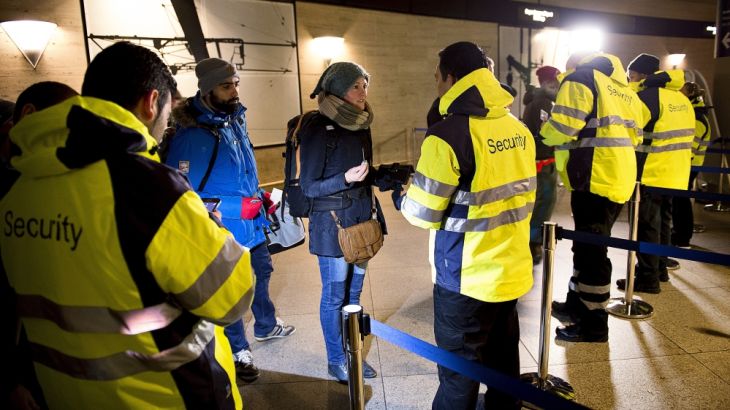Denmark and Sweden tighten border controls
Scandinavia-bound refugees face new barriers as Denmark launches checks on German border following Swedish ID controls.

Denmark has introduced temporary controls along its border with Germany, just hours after Sweden took similar measures to check the flow of refugees.
Sweden began checking documents of travellers from Denmark on Monday for the first time in half a century, causing delays of trains and frustration among travellers.
Keep reading
list of 4 itemsUK police arrest three over deaths of five people in English Channel
UK passes bill to deport asylum seekers to Rwanda: What’s next?
‘Can’t give them jobs’: Rwandans grapple with fears over UK asylum plan
Those without valid ID documents are denied to board buses, trains and ferries bound for Sweden, but cars are exempt from checks.
Denmark’s prime minister said Sweden’s move gave his country no option but to impose its own border controls. He appealed to the European Union to take “collective decisions” to better protect its external borders against the tide of migrants and refugees.
“The Swedish ID checks can increase the risk of a large number of illegal immigrants to accumulate in and around Copenhagen,” Lars Lokke Rasmussen said in Copenhagen, justifying the new controls on the German border.
Swedish PM: ‘Tear gas, attacks – that is not my Europe’
Last year about 163,000 refugees sought asylum in Sweden, the largest number for any EU country relative to its population.
But with arrivals running at around 10,000 a week in November, mostly travelling through Denmark, the Swedish government has said it is time to tighten border controls and asylum rules.
Immediate effect
The ID controls appeared to have an immediate effect. Ewa-Gun Westford, Swedish police spokesperson, said that as of Monday afternoon, “very few” asylum-seeker had arrived by train across the Oresund bridge between Denmark and Sweden.
At the height of the refugee crisis a few months ago, more than 1,000 asylum-seekers crossed the bridge daily.
With increased border controls, people smuggling within the EU could increase. Falsification of IDs could also become big business.
Rights groups have said that child refugees arriving on their own will be hard hit by the new checks, as they often travel without documents.
Of those seeking asylum in Sweden in 2015, about 80 percent lacked passports or equivalent IDs at the time of filing their applications, according to the Swedish Migration Agency.
Peo Hansen, professor of political science at Linkoping University, warned that the ID controls could lead to refugees choosing more dangerous routes to reach Sweden.
“We could see a shift towards boat refugees across the Oresund strait,” he told Al Jazeera.
Since vehicles travelling across the bridge are so far excluded from systematic checks, refugees could still be driven in private cars or smuggled in the cargo hold of trucks, he said.
“With increased border controls, people smuggling within the EU could increase. Falsification of IDs could also become big business.”
The Scandinavian border controls come on the heels of the reintroduction of border checks in Germany, Austria, France, Belgium and several other European countries.
‘Terrorism threat’
Denmark said its controls would last for 10 days but could be extended.
He told Swedish newspaper Dagens Nyheter that the reason Sweden got overwhelmed last autumn was because Denmark functioned as a “transit country”.
WATCH: Greek anarchists cook in solidarity for refugees
Johansson said ID controls could also help authorities to prevent attacks.
“After the attacks in Paris, we’re not only faced with the refugee issue but also the issue of terrorism,” he said.
Schengen zone ‘in danger’
Reacting to the Scandinavian border checks, Germany warned that the passport-free Schengen zone was “in danger”.
Schaefer said it was “crucial that we in Europe find common solutions” to the refugee crisis, and said the EU must now focus on ensuring the security of its external borders.
IN PICTURES: Syrians scale fence at Spain’s African ‘fortress’
Sweden has seen a decrease in the number of people seeking asylum in recent weeks, following news of tighter border checks and stricter rules for residency permits.
The country is facing an acute accommodation shortage for new arrivals, and schools and health services are also under strain.
![More than a million migrants and refugees crossed into Europe in 2015 [AP]](/wp-content/uploads/2015/12/f618dd62186f403688457f080234531a_18.jpeg)